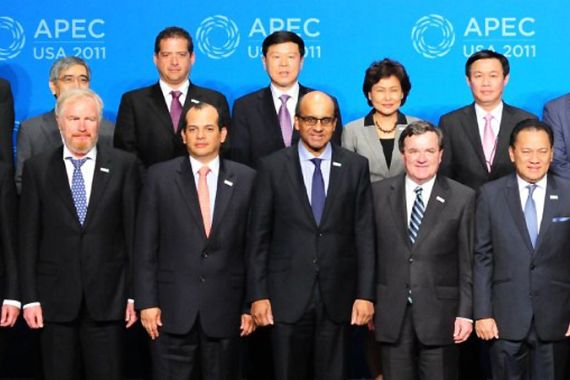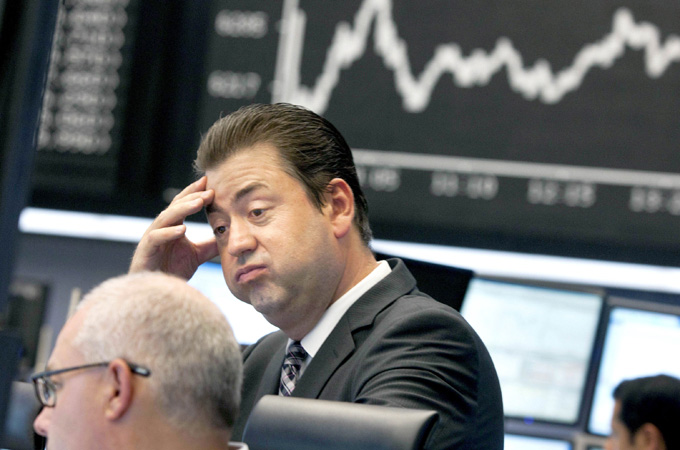APEC ministers press Europe to act fast
Asia-Pacific ministers are increasingly worried about eurozone’s worsening debt crisis before economic summit.

Asia Pacific countries have pressed Europe to act more forcefully to quell its debt crisis, setting the tone for a summit overshadowed by growing alarm over the fallout from eurozone upheaval.
The 19th Informal Leadership Meeting of the Asia-Pacific Economic Co-operation (APEC), scheduled to take place in Hawaii on Saturday, will look closely at regional economic growth, integration, green growth, energy security and regulatory co-operation.
Keep reading
list of 4 itemsEcuador weighs security, international arbitration in latest referendum
‘Triple spending’: Zimbabweans bear cost of changing to new ZiG currency
Boeing hit with 32 whistleblower claims, as dead worker’s case reviewed
|
“It is crucial that Europe move quickly to put in place a strong plan to restore financial stability“ – Timothy Geithner, |
Timothy Geithner, the US treasury secretary, and other APEC finance ministers have agreed to shore up their own economies against Europe’s debt crisis, warning in a statement of “heightened downside risks to the global economy”.
The Asia-Pacific ministers have pledged to take decisive action if necessary to prevent the spillover from Europe’s financial woes from further undermining growth and financial stability across the region.
“The crisis in Europe remains the central challenge to global growth,” Geithner said after ministerial talks in advannce of the summit that encompasses economic heavyweights such as the US and China, and small nations including New Zealand and Papua New Guinea.
His remarks reflected mounting concern among the 21 APEC members about the spillover from Europe that already is starting to slow the pace of growth in one of the world’s most economically dynamic regions.
China’s economic threat
Against this backdrop of eurozone uncertainties and worldwide stagnation, Hu Jintao, the Chinese president, arrived in Honolulu on Thursday to meet fellow leaders in the Asia-Pacific region and discuss ways to ensure regional prosperity.
The annual meeting will bring China and other regional economies to the table with the US, which has deemed the region to be a place of great interest in its economic and political policies.
 |
|
The yuan’s value has been a long-standing issue between China and the US [GALLO/GETTY] |
At the meetings, Hu will discuss China’s positions on world economic governance, economic development in the Asia-Pacific region and the multilateral system of trade, the Chinese foreign ministry said on Thursday.
He is also expected to hold meetings with leaders from other members of the organisation, including Barack Obama, the US president; Yoshihiko Noda, the Japanese prime minister; and Truong Tan Sang, the Vietnamese president.
The summit, to be hosted by Obama in his native Hawaii, has been presented as an effort to make progress on forging a new free-trade area and an environmental technology pact, steps that could eventually foster global growth.
For Obama, who is winding down the costly US-led wars in Iraq and Afghanistan, the APEC gathering is a chance to
reassert US leadership in a region where China poses a growing competitive threat. He will tout Pacific rim ties as a way to create jobs, considered crucial to his 2012 re-election chances.
Geithner also made clear that the APEC summit would pressure China to let its currency, which the US says China keeps artificially low for competitive advantage, to appreciate further.
European fallout
Hillary Clinton, the US secretary of state, also lodged criticism against China, the main rival of the US in
the region, on everything from trade practices to human rights.
While insisting the US was not trying to “constrain” China, Clinton sent a message to regional allies
that the US would be a counterbalance to Beijing’s economic and military influence and would demand it play by trade rules.
“US firms want fair opportunities to export to China’s markets and a level playing field for competition,” she said in a speech shortly after Hu arrived.
| A European recession would be felt strongly in the US and in Asia [Al Jazeera] |
She vowed a US “pivot” towards the fast-growing region and asserted renewed US leadership in what she called “America’s Pacific century”.
The European Union has warned that the 17 countries that use the euro common currency could slip into “a deep and prolonged recession” next year as the debt crisis that has already engulfed Ireland,
Portugal and Greece has shown alarming signs of spinning out of control.
A European recession would be felt sharply in the US, where growth is already anemic, and in Asia, which relies on Europe as a big market for its cars, clothing, consumer electronics and other exports.
“It is crucial that Europe move quickly to put in place a strong plan to restore financial stability,” Geithner said on Thursday. “They’re moving ahead, but we just need them to move ahead more quickly and with more force behind it.”
The best thing APEC economies could do to protect themselves was to take steps to increase their domestic demand, he said.
“These economies, including the United States, have the capacity to do things now to make growth stronger – both to offset some of the pressure we’re facing from Europe, but also because the world as a whole needs it,” Geithner said.
“Even when Europe stabilises, you’re going to see growth damaged by the magnitude of the crisis so far.”
Falling growth
The finance ministers from the 21 economies that make up the APEC forum discussed ways to re-energise economic growth and create jobs through practical measures such as investment in infrastructure and reforms aimed at providing more access to financing for the poor.
 |
| APEC finance ministers have agreed to bolster their own economies against Europe’s troubles [EPA] |
The APEC statement largely agreed with Geithner’s view, noting that downside risks for the global economy had been heightened.
“Growth and job creation has weakened in the region, particularly in advanced economies,” the group said in a statement that outlined a consensus on the need for quick, short-term measures and longer term reforms.
But there was no sign that the summit of countries representing more than half of global economic output would
offer any direct measures to help the eurozone cope with its crisis.
Rather, the focus was buffering themselves against the fallout.
The ministers also reaffirmed a G20 commitment to move more rapidly toward “more market-determined exchange rate systems and enhance exchange rate flexibility” – a clear reference to China’s yuan valuation.
Chinese officials have already expressed doubts about US goals at APEC, including a green growth initiative that would cut tariffs on environmental goods and services, such as solar panels and wind turbines.